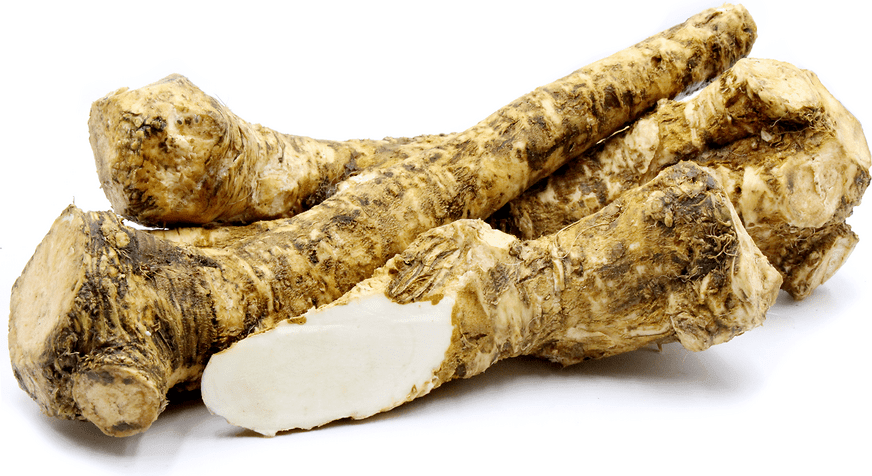Horseradish Root
The Many Benefits of Horseradish Root
English Name: Horseradish Root
What is Horseradish Root?
Horseradish is a perennial plant native to southeastern Europe and western Asia that has been used as a culinary and medicinal complement for millennia. It is a member of the family Brassicaceae, along with its close cousins mustard, wasabi, broccoli and cabbage. Though recognizable for its broad, crinkled leaves and delicate white flowers, the plant is valued for its thick, fleshy, white root, which has a pungent aroma and flavor when crushed or cut. Fresh roots are 1 to 2 inches in diameter and covered in a course brown peel. They are generally grated or ground and preserved in vinegar, sometimes colored with beet juice, and served with meat in a variety of ethnic cuisines. Despite its name, horseradish is toxic to horses, though people consume roughly 6 million gallons of it as a condiment each year in the U.S. alone1.
How does Horseradish Root work?
Horseradish root has almost no odor when it is intact. However, when it is crushed or cut, enzymes in the root break down a glucosinolate component called sinigrin and produce the volatile chemical allyl isothiocyanate, also known as mustard oil. This oil is what gives the crushed root its strong, pungent aroma and flavor, and antibacterial properties. Sinigrin is a powerful antioxidant that interferes with cell mutations that can occur due to free radicals, a natural byproduct of metabolism. Additionally, horseradish is densely packed with nutrients like dietary fiber, vitamin C, folate, calcium, magnesium and potassium though it contributes very few calories2.
What are the benefits of Horseradish Root?
Anyone who has tasted horseradish as a condiment knows its strong pungent flavor and aroma can open the sinus passages and bring tears to the eyes. The phytochemical allyl isothiocyanate is responsible for this effect, which helps promote secretions in the sinuses and lungs that will thin mucus and dilate the airways. Research has shown that horseradish root can alleviate sinus and bronchial symptoms from infection almost as well as antibiotics3. This phytochemical also stimulates the production of salivary, gastric and digestive juices, thereby aiding in healthier digestion and regulating the bowel. Additionally, the dense phytochemical composition of the horseradish root helps boost both the immune system and the metabolism, which can help to increase levels of energy and mental focus while protecting against the common cold and other viral or bacterial diseases1.
Products Featuring Horseradish Root
For Humans:
InstaClear Sinus Relief™ for Sinus Comfort

Native Remedies recommends you consult your doctor before introducing new herbal products into your regimen. Always ensure you are buying high-quality, laboratory-tested supplements from a reputable supplier. At Native Remedies, we back all our products with a 100 percent money-back guarantee. If you’re not happy with your purchase after trying it for 30 days, simply send it back for a refund. Here’s to your good health!
The content provided is for informational purposes only. It is not a substitute for professional medical advice. If you have a health condition, please consult a medical professional and do not use this information to self-diagnose or self-treat.
Resources:
- Seward, Marc. "12 Proven Health Benefits of Horseradish." Healthy Focus. July 09, 2018. Accessed November 04, 2018. https://healthyfocus.org/health-benefits-of-horseradish/.
- Staughton, John. "11 Impressive Benefits of Horseradish." Organic Facts. May 11, 2018. Accessed November 04, 2018. https://www.organicfacts.net/health-benefits/vegetable/horseradish.html.
- "Horseradish: Uses, Side Effects, Interactions, Dosage, and Warning." WebMD. Accessed November 04, 2018. https://www.webmd.com/vitamins/ai/ingredientmono-257/horseradish.
Reviewed by Master Herbalist, Mary Ellen Kosanke
